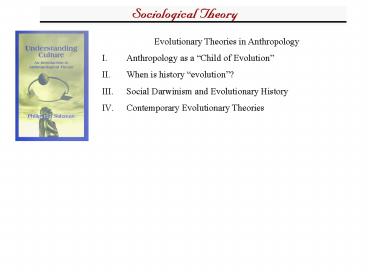Evolutionary Theories in Anthropology - PowerPoint PPT Presentation
1 / 8
Title:
Evolutionary Theories in Anthropology
Description:
Evolutionary Theories in Anthropology. Anthropology as a 'Child of ... Sociobiology/evolutionary ecology natural selection variation in successful reproduction ... – PowerPoint PPT presentation
Number of Views:349
Avg rating:3.0/5.0
Title: Evolutionary Theories in Anthropology
1
- Evolutionary Theories in Anthropology
- Anthropology as a Child of Evolution
- When is history evolution?
- Social Darwinism and Evolutionary History
- Contemporary Evolutionary Theories
2
- Anthropology as the Child of Evolution
- The technological revolution in Europe
- The Enlightenment and the scientific revolution
- The idea of progress based on a developmental
sequence
3
Discussion Question When does history or change
evolution?
4
Some Early Typologies of Evolutionary Stages
- Edward Tylor and Lewis Henry Morgan from
savagery to civilization - Marx and Engels a sequence of modes of
production tribal-slave-feudal-capitalist-sociali
st - Ferdinand Tönnies from gemeinschaft to
gesellschaft - Durkheim from mechanical to organic solidarity
5
Social Darwinism and Its Legacy
What was Social Darwinisms long-term impact on
evolutionary theorizing in anthropology and
sociology?
6
Contemporary Evolutionary Theory In
twentieth-century anthropology, the focus of
evolutionary theorists has been less the
evaluative question of evolutionary progress than
the understanding of evolution as cumulative
social and cultural transformation over time.
- change tends to be cumulative
- but no predetermined destination
- and evaluation left to others
7
- Three Contemporary Examples of Evolutionary
Theories - Leslie White amount of energy
- Ernest Gellner stages of cognitionthe nature
of culturally-institutionalized knowledge - Sociobiology/evolutionary ecologynatural
selectionvariation in successful reproduction
8
Contra Evolutionism What arguments have been made
against evolutionary theories?
- Ignored role of cultural diffusion
- Insufficiently holistic
- too much emphasis on origins, not enough on
functions - Weak evidencemainly speculation
- Unacceptable implied value judgmentsethnocentric
- Shades of Social Darwinism































